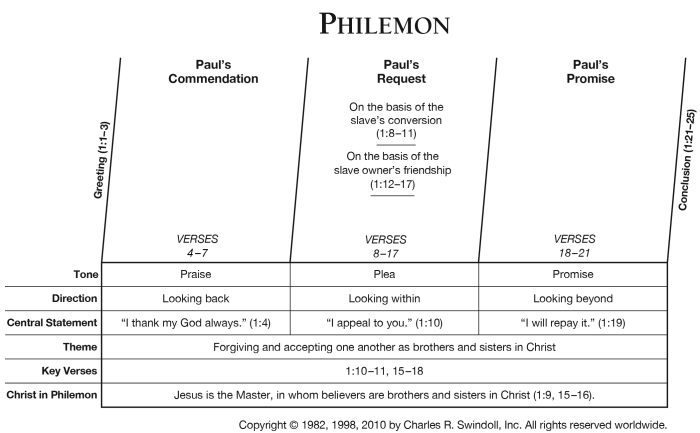Philemon Bible Study Questions and Answers: Exploring Forgiveness and Reconciliation delves into the rich tapestry of the biblical book of Philemon, offering profound insights into the transformative power of forgiveness and the complexities of reconciliation. This study guide unravels the intricate relationships between characters, their struggles, and the enduring themes that resonate deeply with readers today.
Through a comprehensive examination of the book’s historical and cultural context, this guide illuminates the social and economic factors that shaped the narrative, providing a deeper understanding of the challenges faced by the characters. By exploring the theological implications of forgiveness and reconciliation, this study guide unveils the profound impact these concepts have on our Christian faith and our relationships with others.
Philemon’s Character and Hospitality

Philemon, a wealthy Christian from Colossae, exemplified generosity and kindness. Paul commended him for his love, faith, and hospitality. Philemon’s home served as a meeting place for the local church, and he willingly provided for the needs of his fellow believers.
Significance of Hospitality in the Early Church
Hospitality was a fundamental value in the early church. It fostered a sense of community and mutual support. By welcoming strangers and travelers, Christians demonstrated the love and compassion of Christ. Hospitality also played a role in evangelism, as it provided opportunities to share the gospel with those outside the faith.
Paul’s Appeal for Onesimus: Philemon Bible Study Questions And Answers
Onesimus, a runaway slave who had wronged Philemon, sought refuge with Paul. Paul saw this as an opportunity for reconciliation and transformed Onesimus’s life. He wrote to Philemon, urging him to receive Onesimus not as a slave but as a beloved brother in Christ.
Challenges and Complexities of Reconciliation
Reconciliation in this situation was not straightforward. Philemon had been wronged by Onesimus and may have been reluctant to forgive him. However, Paul appealed to Philemon’s Christian principles, reminding him of the forgiveness he had received from God.
The Theme of Forgiveness
Forgiveness is the central theme of the book of Philemon. Paul emphasizes the importance of forgiving others, even when they have wronged us. Forgiveness is not only a command but also a transformative power that can heal relationships and restore brokenness.
Implications for Christian Relationships, Philemon bible study questions and answers
The theme of forgiveness has profound implications for Christian relationships. It teaches us to prioritize reconciliation over retribution and to extend grace to those who have wronged us. Forgiveness promotes healing, unity, and a deeper understanding of God’s love.
Practical Applications
The principles of forgiveness and reconciliation can be applied in our own lives. We can practice forgiveness by releasing bitterness and resentment, seeking reconciliation with those we have wronged, and offering grace to those who have wronged us.
Seeking Reconciliation
Seeking reconciliation is not always easy, but it is essential for healing and restoring relationships. It involves acknowledging our own wrongdoing, apologizing sincerely, and taking steps to make amends.
Historical and Cultural Context

The book of Philemon was written in the context of the Roman Empire, where slavery was prevalent. The social and economic factors of the time influenced the story, as Philemon’s status as a wealthy slave owner and Onesimus’s status as a runaway slave shaped the dynamics of their relationship.
Implications of Slavery
The institution of slavery had a significant impact on the relationship between Philemon and Onesimus. It created a power imbalance and made it difficult for Onesimus to assert his own agency. Paul’s appeal for reconciliation challenged the social norms of the time and emphasized the equality of all believers in Christ.
Theological Implications

The book of Philemon has important theological implications. It demonstrates the power of the gospel to transform relationships and overcome social barriers. Forgiveness and reconciliation are central to the Christian message, as they reflect the love and grace of God.
Relationship to the Gospel Message
The theme of forgiveness in Philemon is closely related to the gospel message of salvation. Just as God has forgiven us our sins, we are called to forgive others. Forgiveness is an essential aspect of our relationship with God and with one another.
FAQ Summary
What is the central theme of the book of Philemon?
The central theme of the book of Philemon is forgiveness and reconciliation.
How does Paul appeal to Philemon to receive Onesimus?
Paul appeals to Philemon to receive Onesimus as a brother in Christ, emphasizing the transformative power of forgiveness and the importance of reconciliation within the Christian community.
What are the practical applications of the principles of forgiveness and reconciliation in our own lives?
Practical applications of forgiveness and reconciliation include seeking reconciliation with those we have wronged, extending forgiveness to others, and fostering a spirit of unity and peace within our relationships and communities.